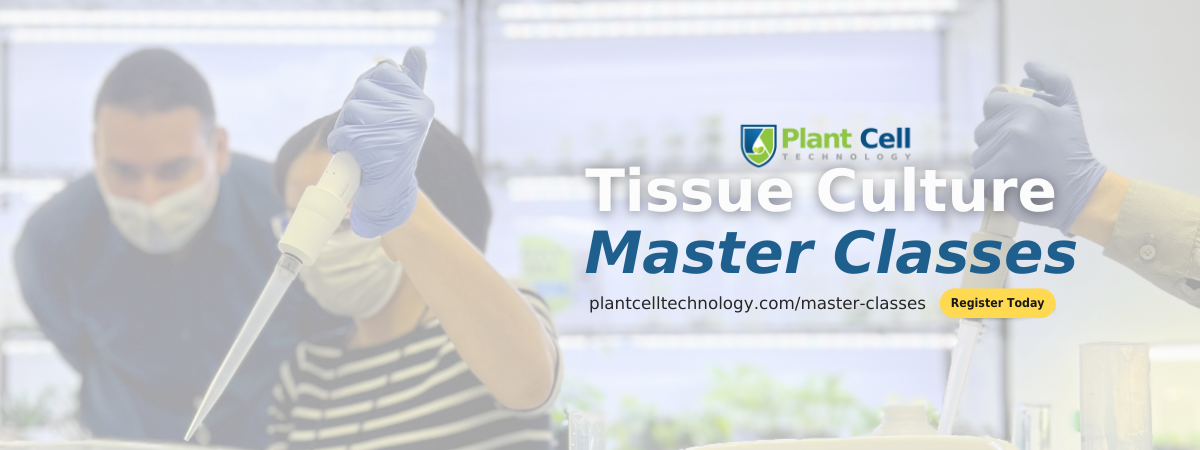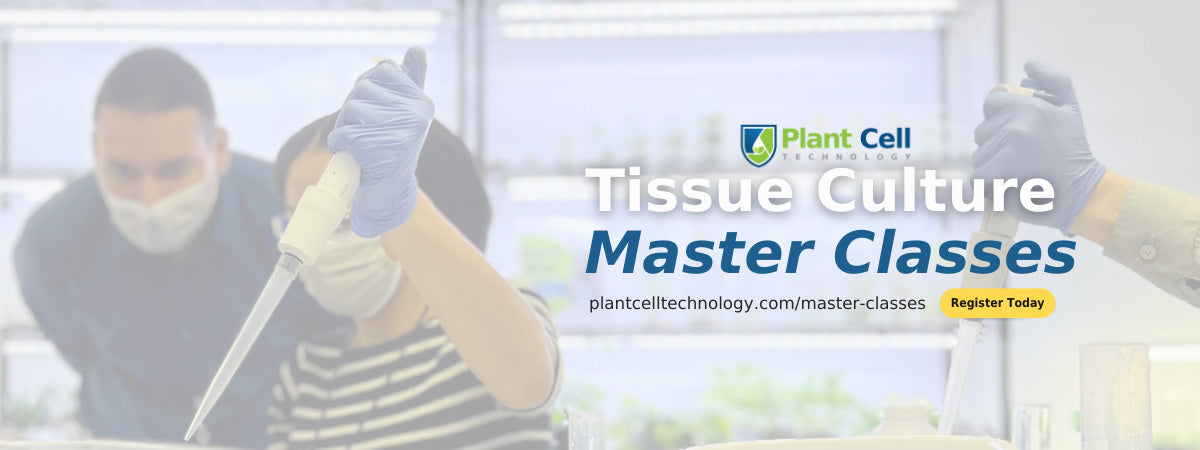
The Future of Cannabis Cloning - Tissue Culture
As a content and community manager, I leverage my expertise in plant biotechnology, passion for tissue culture, and writing skills to create compelling articles, simplifying intricate scientific concepts, and address your inquiries. As a dedicated science communicator, I strive to spark curiosity and foster a love for science in my audience.


Plant tissue culture is more than just another propagation technique. It may not be all that new, but it is certainly gaining more favor among conservationists as it is becoming as a modern technique for propagation and conservation of endangered plant species.
Plant tissue culture is also one of the simplest and most effective tools for researchers. But aside from the technique’s efficiency in research, conservation, and propagation, tissue culture is also rapidly becoming an essential element in business for many industries.
The technique may seem to have a hefty start-up cost, but it could prove to be an investment that pays off in the long run. Whether used for plant propagation, disease management, or genetic enhancement, tissue culture is spreading throughout industries.
What makes tissue culture such a valuable addition to so many industries? Well, it only requires small amounts of tissues, sometimes just a couple of cells (known as explants). From just one small explant, thousands of mature plants can be propagated. You can find plenty of information on our blog about how tissue culture can be used to propagate plants, and even how it can be performed at home.
So, in this article, we are going to look at an important issue affecting the entire plant kingdom: conservation. Let’s dig in: how can tissue culture play an effective role in the conservation of rare species?
What do the climate change deniers, the climate activists, and all the misinformed people with opinions on the internet have in common? Whether you agree with climate change or not, one thing mostly all of us agree with is that the impact of human activities and human society on natural ecosystems around the world is grave.
Public concern is growing, and with this concern comes the growing research into how we can preserve increasingly fragile ecosystems around the planet, as long as that preservation does not interrupt the comfort of our daily life, that is.
In order to make way for human activity, there are many natural ecosystems and species that have come under threat and require protection and intervention. This intervention comes in the form of what we call conservation. Some regions have plant species that are now endangered, and several solutions are being employed to address this.
Botanical gardens, categorization and management of environmentally protected zones and in vitro growing techniques are three primary conservation methods.
In this article, we will talk about in vitro growing, and the role that tissue culture plays in preserving endangered species.
For proper ex-situ conservation, wide genetic variation needs to be used. Why? Well, researchers believe that a poor genetic variation restriction can lead cause a species to lose its ability to adapt to different habitats. Plants need to have adequate variation in their genes if they are to adapt and survive in natural environments.
So, it is therefore imperative that plants with a broad genetic base are collect
Commercial cannabis should be free of harmful compounds and chemicals and oftentimes require specific genetics. Tissue culture offers growers the chance to cultivate high yielding, quality, and gene-specific, uniform plants.
Overview
The marijuana industry is still on a wave of legalization, even if the initial buzz has petered out. What hasn’t burnt out, however, is the research. Legalization has opened up the doors for research, and we see exponential development in science and technology-related cannabis studies.
Tissue Culture, or micropropagation, is set to change the future of cannabis cloning. Although cloning is not a new concept, cloning plants with tissue culture is coming into the spotlight as the cannabis industry continues to expand. Furthermore, cell technology is an ally for businesses that require high yields, excellent genetics, and consistent results. Let's have a glimpse into this cloning method and find out why it is setting the tone for commercial cannabis growers.
Seeds or clones; these are the two growing methods you may have heard of, or even tried yourself. For most novice marijuana growers, these have been the only two choices for some time, up until recently. Growing from seeds can help to avoid pests and other contaminants, but seeds require consistent attention as they grow, and as they develop into mature plants, they can develop into seeding male plants.
Using clones can offer a rapid alternative, and also offers a way to guarantee the genetics you desire in your plants. But as with everything, there are downsides; they can succumb to diseases more easily and require more time than plants grown from seeds. Once you get the hang of cloning, it can be an effective and rewarding method. However, in cases where genetics, consistently high yields, and quality are of extreme importance, traditional cloning may not be enough. Tissue culture is a form of cloning that requires a sterile environment, healthy plant tissues, and several other parameters that need to be strictly met.
Researchers are making monumental advancements in cannabis studies and research. One significant area is the cultivation of cannabis. In order for cannabis to be cultivated on a commercial level, there are a plethora of parameters to observe - and that doesn’t even include the legal parameters, which are different for each state. Commercial cannabis should be free of harmful compounds and chemicals and oftentimes require specific genetics. Tissue culture offers growers the chance to cultivate high yielding, quality, and gene-specific, uniform plants.
And with the commercial cannabis market set to continue in its stride, micropropagation could become the norm amongst cannabis growers.

What is Plant Tissue Culture?
Plant Tissue culture can be referred to as micropropagation, and as the name suggests, the process to introduce a few plant tissues on artificial media under controlled conditions for propagating plants.
In the process, plant tissue (referred to as the explant) is gathered from the mother plant and placed in a sterile environment or container containing gelling media rich with nutrients and vitamins to ensure healthy growth. The media provides the developing plantlets with the necessary nutrients and hormones required for healthy root and shoot development.
If you are familiar with traditional cloning, you will know that it can take up a fair amount of space should you account for your mother plant as well. With tissue culture, the space required is significantly less, and your strain genetics are still preserved. Once the plant media has grown and is ready to be transplanted, it is transferred into a different medium that helps to manage growth.
Now that we know what tissue culture is, and have a general idea about how it works, let's see why some are considering tissue culture to be the future of cannabis cloning. While the entire process requires strict and meticulous observation of protocols and cleanliness, it is a rewarding method that could be used for the following significant developments in the cannabis industry.

Preserved plant genetics
New parents are often eager to see who the child takes after. Whose genes are evident in their new bundle of joy? The truth is that both parents’ genes are present, and both parents are also aware that the child will not be an exact match, genetically speaking, of either the mother or father. It works much the same with cannabis seeds, each seed has a different genetic composition, sometimes almost identical to the plant it came from, and sometimes slightly different. With tissue culture propagation, on the other hand, the genetics are guaranteed to be a genetic copy of the mother plant used.
In a business where genetics and large yields equate to high profit, tissue culture can be used to not only preserve plants that carry rare genetics but also to ensure and secure specific plant genetics.
Increased Yield
The tissue culture process is space-efficient and therefore, can utilize space for more plantlets. In a small jar you can multiply as many as hundreds of tissue culture plants. Further, in a controlled condition and disease-free environment, you will have more number of living and thriving plants compared to what you obtain through other plant propagation approaches.
This, coupled with ideal genetics, offers a yield that is not only higher but more consistent as well. And the result of this? Higher profits for companies and commercial growers.

Optimized and Efficient
Plants grown through plant tissue culture will require a strictly controlled sterile environment, and the plants will need diligent attention. However, this due diligence will offer a reward; the new plantlets will carry excellent genes that will allow for the highest yield in the quickest manner possible.
Now, why is this method likely going to replace conventional methods of cloning cannabis?
What drives an industry? Profit? Perhaps, but not entirely. For there to be a profit, there needs to be a demand. And in the cannabis sector, there is plenty of demand afoot.
While the average cannabis consumer is still uncertain about the specifics, knowledge about cannabis is spreading, and consumers will begin to have high standards and specific demands. In order to cope, the commercial cannabis industry will need to rely on methods and practices that allow them to grow superb and precise cannabis genotypes. This is where micropropagation will begin to take over, first in large scale commercial grows and then, as it becomes a normalized practice, in small scale grows and even legal home grows.
What Does The Future of Cannabis Holds?
The cannabis industry has experienced rapid growth in recent years, not only in the United States but also globally. It is projected that the current cannabis sales of $13.4 billion could reach $33.6 billion by 2025.
However, the industry's growth and development will heavily depend on the legal and regulatory landscape. The utilization of cannabis in the alcohol, tobacco, and pharmaceutical sectors has the potential to reshape the cannabis industry.

For instance, during the COVID-19 pandemic, there has been a significant increase, around 91%, in the consumption of medicinal cannabis due to its potential benefits for mental health. However, the cannabis industry still faces significant challenges such as high interest rates, state-level legalization variations, and stringent regulations, which hinder its expansion.
These challenges also affect research and cultivation practices, impacting the search for effective solutions to enhance cannabis plant growth.
In this context, tissue culture holds great promise for the cannabis industry and licensed producers. It offers numerous potential benefits and opportunities for the cultivation and propagation of cannabis plants.
What are those benefits and how can tissue culture be the future of Cannabis industry? Find the answers in this blog.
CREATING AND PRESERVING YOUR "ELITE" CANNABIS VARIETIES THROUGH PLANT CELL TECHNOLOGY?

Plant Cell Technology is a leading company in the area of plant tissue culture. We conduct comprehensive tissue culture master classes led by industry experts with 10-30 years of experience.
The classes are designed to teach you everything about tissue culture, ranging from its basic introduction to pro techniques such as synthetic seed production (which can help you preserve your precious strain) and meristem culture (which enable you to produce disease-free plants). A range of other topics that will be covered during the class includes Pathogen remediation, sterilization techniques, synthetic seed technology, and many more.
Here’s our complete curriculum.
Our upcoming master class will be a 3-days class starting from August 24-26, 2023. It will be conducted by one of the legends in the Cannabis Tissue Culture Industry, Bill Graham.
The bookings for the class have already been started. And, for one-on-experience with our tissue culture expert, only a limited number of seats are available.
So, if you are interested in giving a boost to your Cannabis business, then book your seats TODAY!
ed from natural sources. And there is one method to do this that has consistently proven effective: tissue culture. Although tissue culture has previously received only a bare amount of attention, it has begun to reach a wider audience thanks to the realization of its efficiency for cannabis growing. Not only can tissue culture preserve genetics, but it can also be used to cultivate strains with extreme genetic precision in a conservative amount of space.
Preliminary studies show us that micropropagation technology holds promise for many species that are either facing extinction or are on the brink of it.
Whether tissue culture is used to manipulate and maintain biological diversity, or for the preservation of endangered species, it is one method that ensures the safety and securities of our natural habitat and the species that comprise it.
Protocols are of paramount importance for successful tissue culture growing. Most protocols will be dependent on the species, and these protocols must be followed with precision if a grower wants to have success with tissue culture techniques.
There is an extreme amount of pressure on natural environments and populations to maintain rare plant species, and this is where tissue culture can be used to relieve that pressure and propagate those species without leaving it up to chance or the natural environment. It seems only fair that if human progression and development have caused the species to come under threat, then human scientific development should be used to bring these species back to a safe and secure place.
The importance extends beyond maintaining a plant species that looks pretty as an ornament or is rare; several endangered species carry further medicinal benefits for humanity and must be maintained. By using tissue culture, plant species can be studied at length and in great detail without causing further harm to natural populations or environments.
Blog Categories
View by Level
Popular Blogs

New Technical Agar Vs Supreme Agar
Introduction What’s the secret element that supports and holds plants in vitro? Not sure? It’s the solidifying agent. Solidifying agents...
Read More
Get the Protocol: How to Tissue Culture Nepenthes Using Nodes and Seeds
Introduction This plant is non-vegeterian... ...and we're not kidding! Nepenthes belongs to one of the most interesting families of carnivorous...
Read MoreSubscribe to Our Newsletter









Join the conversation
Your email address will not be published. Required fields are marked